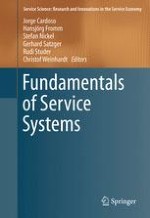This textbook addresses the conceptual and practical aspects of the various phases of the lifecycle of service systems, ranging from service ideation, design, implementation, analysis, improvement and trading associated with service systems engineering. Written by leading experts in the field, this indispensable textbook will enable a new wave of future professionals to think in a service-focused way with the right balance of competencies in computer science, engineering, and management.
Fundamentals of Service Systems is a centerpiece for a course syllabus on service systems. Each chapter includes a summary, a list of learning objectives, an opening case, and a review section with questions, a project description, a list of key terms, and a list of further reading bibliography. All these elements enable students to learn at a faster and more comfortable peace.
For researchers, teachers, and students who want to learn about this new emerging science, Fundamentals of Service Systems provides an overview of the core disciplines underlying the study of service systems. It is aimed at students of information systems, information technology, and business and economics. It also targets business and IT practitioners, especially those who are looking for better ways of innovating, designing, modeling, analyzing, and optimizing service systems.
